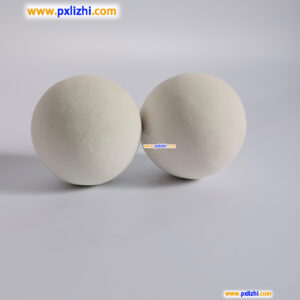
。
# Inert Ceramic Ball Applications in Industrial Processes
## Introduction to Inert Ceramic Balls
Inert ceramic balls are widely used in various industrial processes due to their excellent chemical stability, high temperature resistance, and mechanical strength. These small spherical ceramic pieces play a crucial role in supporting catalysts, distributing gases or liquids, and protecting more expensive materials in reactors and towers.
## Key Properties of Inert Ceramic Balls
The effectiveness of inert ceramic balls in industrial applications stems from their unique properties:
– High temperature resistance (up to 1600°C)
– Excellent chemical inertness
– Superior mechanical strength
– Low water absorption
– Good thermal shock resistance
– Uniform size and shape
## Major Industrial Applications
### 1. Petrochemical Industry
Inert ceramic balls serve as catalyst supports and bed separators in petroleum refining processes. They help distribute reactants evenly across catalyst beds in:
– Hydrotreating units
– Catalytic reformers
Keyword: inert ceramic ball
– Fluid catalytic cracking (FCC) units
– Hydrocracking processes
### 2. Chemical Processing
Chemical plants utilize inert ceramic balls in various reaction vessels and towers for:
– Gas distribution in ammonia synthesis
– Acid production processes
– Polymerization reactions
– Distillation column packing
### 3. Environmental Protection
These ceramic balls find applications in environmental engineering for:
– Flue gas treatment systems
– Wastewater purification towers
– VOC (Volatile Organic Compounds) abatement
– Desulfurization processes
### 4. Other Industrial Uses
Additional applications include:
– Thermal storage systems
– Heat exchangers
– Foundry operations
– Glass manufacturing
## Selection Criteria for Industrial Applications
When choosing inert ceramic balls for specific industrial processes, engineers consider several factors:
– Operating temperature range
– Chemical environment
– Pressure conditions
– Required porosity
– Size and shape specifications
– Mechanical load requirements
## Advantages Over Alternative Materials
Inert ceramic balls offer distinct benefits compared to metal or plastic alternatives:
– Longer service life in harsh conditions
– Better resistance to corrosion and erosion
– Higher temperature tolerance
– Lower maintenance requirements
– More cost-effective in long-term operations
## Future Trends in Industrial Applications
The demand for inert ceramic balls continues to grow as industries seek more efficient and durable solutions. Emerging applications include:
– Advanced catalytic processes
– Clean energy production
– High-temperature filtration
– Specialized chemical synthesis
As industrial processes become more sophisticated, the role of inert ceramic balls as essential components in chemical reactors and processing equipment will likely expand further.